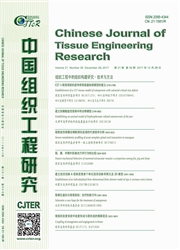

 中文摘要:
中文摘要:
观察小于0.1 Gy剂量碳离子全身辐射引起的小鼠脾淋巴细胞增殖及血清干扰素的变化。方法:实验于2006-11在中国科学院近代物理研究所医学物理实验室进行。①实验过程:取昆明系小鼠30只,采用完全随机设计方法分为5组,每组6只,采用离子束进行全身照射。^12℃^6+离子照射在兰州重离子研究装置(HIRFL)辐照终端进行,照射剂量为0,0.01,0.03,0.05,0.10Gy。麻醉照射后24h,小鼠摘眼球取血。②实验评估:采用ELISA法测定血清y-干扰素含量,操作严格按试剂盒说明进行。将眼球取血后的小鼠脱颈处死,无菌条件下取出脾脏,常规制备单细胞悬液,采用MTT法检测刀豆蛋白A和脂多糖对脾淋巴细胞的增殖作用。结果:30只小鼠均进入结果分析。①辐射对小鼠血清干扰素的影响:与未照射正常小鼠比较,0.01Gy和0.03Gy碳离子束照射后,小鼠血清中y-干扰素含量明显增高(P〈0.05)。照射剂量继续增大至0.05Gy和0.10Gy时,清y-干扰素含量下降。②辐射对小鼠脾淋巴细胞增殖的影响:与未照射组比较,0.01Gy碳离子束照射可明显促进刀豆蛋白A诱导的T淋巴细胞增殖和脂多糖诱导的B淋巴细胞增殖(P〈0.001,P〈0.001),其促进作用与0.03Gy组比较,差异有显著性意义(P〈0.01)。0.05Gy照射开始抑制脾淋巴细胞增殖指数,当照射剂量增大为0.10Gy时显示出明显的抑制作用。结论:0.01Gy和0.03Gy碳离子束照射能刺激淋巴细胞增殖,并能诱导y-干扰素活性以增强机体免疫力。
 英文摘要:
英文摘要:
To investigate the changes in the proliferative response of splenic lymphocytes and the concentration of serum interferon (IFN-y) in mice induced by low doses carbon (^12C^6+) ion irradiation. METHODS: The experiment was carded out in the laboratory of phsical medicine, Institute of Modern Physics, Chinese Academy of Science in November 2006. ①Thirty Kunming mice were randomly divided into five groups with 6 animals in each group and irradiated with 0, 0.01, 0.03, 0.05, and 0.10 Gy ^12C^6+ ion at Heavy Ion Research Facility Laboratory of Lanzhou. Twenty-four hours after irradiation, the eyeballs of mice were removed and blood was harvested. ②The concentration of IFN-y in serum was detected by ELISA kit. After the mice were executed, the spleen was harvested under sterile condition to prepare spleen mononuclear cell suspension. Then the effect of ConA and lipopolysaccharide (LPS) on the proliferations of mononuclear cells was tested by MTT assay. RESULTS: All 30 mice were involved in the result analysis. ①The concentration of IFN-y in serum was remarkably increased after irradiation with 0.01 Gy and 0.03 Gy compared with that in controls (P 〈 0.05). However, the concentration of IFN-y was decreased after irradiation with 0.05 Gy and 0.1 Gy. ②Compared with control group, the proliferation of T lymphocytes induced by ConA and B lymphocytes induced by LPS was remarkably increased after irradiation with 0.01 Gy (P 〈 0.001, P 〈 0.001 ), and the effect was of significant difference compared with that of 0.03 Gy (P 〈 0.01). The irradiation with 0.05 Gy presented a inhibition to the proliferation of splenic lymphocytes, and the inhibition was even obvious when irradiating with 0.10 Gy. CONCLUSION: 0.01Gy and 0.03 Gy ^12C^6+ ion irradiation can stimulate the proliferation of splenocytes and induce the secretion of IFN-y finally enhance the immune function.
 同期刊论文项目
同期刊论文项目
 同项目期刊论文
同项目期刊论文
 High-efficiency transfer and expression of AdCMV-p 53 in human cervix adenocarcinoma cells induced b
High-efficiency transfer and expression of AdCMV-p 53 in human cervix adenocarcinoma cells induced b Adenovirus-mediated wild-type p53 transfer radiosensitizes H1299 cells to subclinical-dose carbon-io
Adenovirus-mediated wild-type p53 transfer radiosensitizes H1299 cells to subclinical-dose carbon-io Effect of N-acetylcysteine on 12C 6+ ion Irradiation-induced Lymphocytes DNA Damages and Immunity Ch
Effect of N-acetylcysteine on 12C 6+ ion Irradiation-induced Lymphocytes DNA Damages and Immunity Ch Evaluation of sex specificity on oxidative stress induced by 12C 6+ ion irradiation in lungs of male
Evaluation of sex specificity on oxidative stress induced by 12C 6+ ion irradiation in lungs of male Induction of cytogenetic adaptive response in spermatogonia and spermatocytes by pre-exposure of mou
Induction of cytogenetic adaptive response in spermatogonia and spermatocytes by pre-exposure of mou 期刊信息
期刊信息
